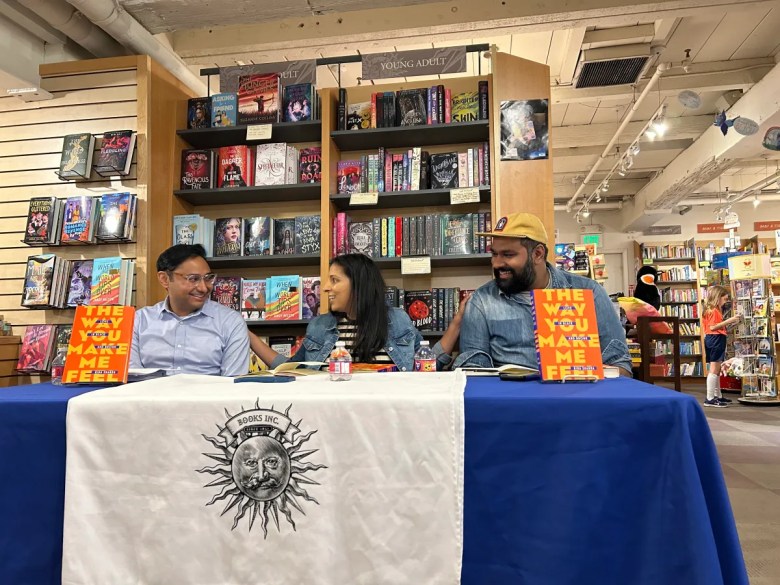Picture an interracial couple in love. If one of the two lovers your mind conjured up is white, then author Nina Sharma might have a thing or two to say about that. Lately, she’s making her point through her book “The Way You Make Me Feel: Love In Black And Brown,” her debut essay collection about her own Afro-Asian love story.
“Who gets the love story in America? The white characters!” said Sharma, in an interview with this publication on the sidelines of a recent promotional event at Books Inc. Palo Alto, part of a multi-city book tour. “The Black or brown character is like ‘the quirky best friend’ — super under-written and under-represented, and I wanted to tell this story to combat that erasure and portray us with more humanity than we’re often given.”
The book is about more than just love; her story comes wrapped in layers of legal and socio-cultural history of race in the country — she writes about the Lovings, among other hard-hitting truths — as well as other everyday realities like racially motivated crimes, immigration trauma and white supremacy.
Despite the serious subject, though, humor jumps off nearly every page as she lays bare different aspects of her interiority, from lust to lunacy and everything in-between. For a trained memoir writer, of course, being scandalously honest comes with the territory. Or does it? “I want to break the silences that hold me back from living my life,” she said. “Break a silence or say something that is otherwise unspeakable.”
That is arguably a difficult pursuit. “The challenge is how to get to that place where you’re most vulnerable,” she said, recalling what one of her mentors at graduate school — Sharma got her MFA from Columbia University — said in this regard. “The personal essay gains its plot by not being a flat level of self disclosure but by diving deep into the self and gaining a vertical dimension. That’s what I always chase, this moment where you feel yourself taking a risk in disclosing something that’s deeply vulnerable.”
The book is intensely personal and in equal measure, perilously political. To Sharma, the two are inextricably bound. “I don’t think I’d be able to tell my personal story without a broader political landscape being part of the book,” she said. “It’s that combination that felt like my story in its most authentic form was coming forward.”

Other than delighting readers with the ‘rom-cominess’ of her interracial marriage, Sharma also hopes to make a dent on society with this book. “I feel like anti-Blackness is baked into our process of assimilation; by ‘our’ I mean South Asian Americans or South Asian immigrants,” she said. “And I really just want to pull that awareness up, say the quiet part out loud.”
Sharma’s parents came to this country through the 1965 Immigration Act, which lifted race-based barriers to immigration. “That was just on the heels of the Civil Rights Movement,” she said. “All of that made their lives so much easier than they would have been as immigrants in America. We owe a great debt to Black Americans.”
But ironically, Afro-Asian allyship was not what ensued. “Instead, what happened was we were split apart into archetypes of the ‘model minority myth’ of the ‘passive,’ ‘docile,’ upwardly mobile Asian American immigrant, positioned up against the ‘problem minority myth’ of the ‘loud’ or ‘hostile’ Black American …” she said. “For South Asian Americans so much of our experience is running toward those archetypes because they felt safer, but it’s a false notion of safety, one that keeps us quiet and in pain.”
It took Sharma around a decade to write and publish this book, which, despite its social relevance, is at its very core, a real life love story between a brown woman and a Black man. “White America wants to position race as a story of pain, but we’re more than our pain,” she said. “Race can be a love story and I really just wanted to embrace that.”
Her next literary outing is a memoir about her relationship with her bipolar diagnosis. “For me, this has been the journey of going from a writer to an author,” said Sharma, who also teaches English at Barnard College. “I’m still figuring out what it means to step into that identity.”
Nina Sharma’s “The Way You Make Me Feel: Love In Black And Brown” is published by Penguin Press.
This post was originally published on here







